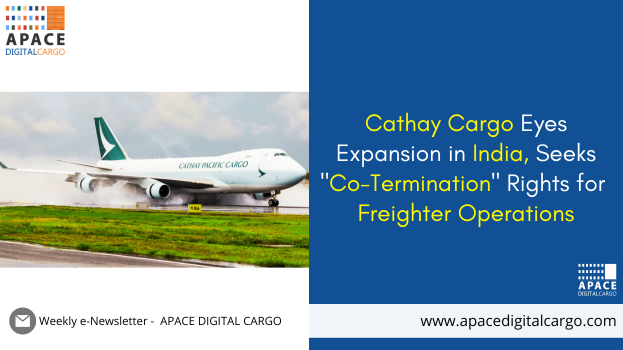
Cathay Cargo is exploring opportunities to expand its operations in India and has expressed a desire for its freighter planes to be permitted to “co-terminate” flights between multiple Indian destinations under the open sky framework, according to a senior company official.
India’s open sky policy allows foreign cargo carriers to operate freely from all international airports, a move designed to expedite the transportation of goods, particularly to boost the export of perishable items.
Tom Owen, Director of Cargo at Cathay Cargo, described the open sky policy as “positive for India,” adding that the company is keen to grow its presence in the country.
“We would also like to see the ability to co-terminate our flights. For example, we’d like to fly into Delhi, then move on to Kolkata, and finally return to Hong Kong, allowing us to serve multiple destinations in one trip,“ Owen told PTI in an interview.
Cathay Cargo is optimistic about India’s economic growth and is eager to expand its services in the region. Owen emphasized that the company is ready to “redeploy capacity” to meet the demands of the Indian market.
“If allowed under the open skies framework, co-terminating aircraft could enable us to fly into, say, Mumbai, then proceed to Kolkata, thereby serving three markets in one go,” Owen explained. “This would enhance our ability to uplift cargo from multiple locations, including cities like Bengaluru and Ahmedabad, where there is significant demand.”
Owen also highlighted the company’s positive outlook on India’s economic trajectory, driven by the rapid growth of exports in sectors such as pharmaceuticals, automobile components, electronics, and agriculture.
“We remain highly optimistic about India’s growth prospects in both the short and long term,” he said, noting the “miraculous” economic growth, infrastructure development, and skilled workforce in the logistics sector over the past decade.
Owen pointed to the impressive growth in exports, particularly in air-freighted goods like pharmaceuticals, auto parts, and fresh produce, as a sign of India’s robust potential. The ongoing development of national highways, improved trucking capabilities, and investment in airport infrastructure are easing previous bottlenecks, further boosting confidence in the air cargo sector.
Cathay Cargo has long-standing relationships with India’s generic pharmaceutical companies and plays a key role in transporting auto parts, whole vehicles for testing, and aircraft engines to support major airlines like Air India and IndiGo.
Owen also remarked on India’s increasing role in global electronics exports, as China’s manufacturing shifts to other regions, with India benefiting from this transition.
Additionally, India’s agricultural productivity offers significant opportunities for exporting fresh vegetables and flowers to global markets.
Cathay Cargo is also exploring collaborations with IndiGo and other passenger carriers to utilize aircraft belly space for cargo transport.
“We are in discussions with IndiGo about growth opportunities, although nothing has been finalized yet,“





